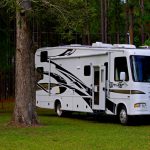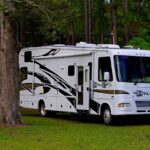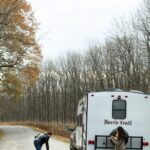Imagine waking up every day with a new view—mountains one morning, ocean waves the next. Sounds dreamy, right? But can you really live in an RV permanently and make that dream your reality? Spoiler alert: yes, you can! But before you pack your bags and hit the road, there’s a lot to consider—from legal hurdles and state regulations to choosing the perfect rig and budgeting for life on wheels.
In this comprehensive guide, we’ll unravel the truth about full-time RV living in 2025. We’ll share 15 essential things you must know before committing to the nomadic lifestyle, including which states welcome permanent RV residents, how to stay connected on the road, and insider tips from seasoned RV enthusiasts. Ready to discover if the RV life is your ticket to freedom or just a passing fantasy? Let’s dive in!
Key Takeaways
- Living in an RV permanently is achievable but requires careful planning around legalities, budgeting, and lifestyle adjustments.
- State laws vary widely—some like Florida and South Dakota are RV havens, while others have strict restrictions.
- Choosing the right RV (Class A, B, C, fifth wheel, or travel trailer) is crucial for comfort and functionality.
- Budget realistically for expenses including maintenance, campground fees, fuel, and insurance.
- Staying connected via mobile hotspots, satellite internet, and mail forwarding services is essential for modern RV living.
- Join the community! Campground memberships and online forums can make full-time RV life more enjoyable and manageable.
Ready to find your perfect home on wheels?
👉 Shop top RV types here:
- Class A Motorhomes on RVShare | Tiffin Motorhomes Official Website
- Fifth Wheel Trailers on Camping World | Keystone RV Official Website
- Class B Camper Vans on Outdoorsy | Winnebago Official Website
Table of Contents
- ⚡️ Quick Tips and Facts About Living in an RV Permanently
- 🏕️ The Road to Freedom: A Brief History and Evolution of Full-Time RV Living
- 🚐 What Does It Really Mean to Live in an RV Full-Time? Lifestyle, Challenges, and Perks
- 🔍 15 Essential Things You Must Know Before Living in an RV Permanently
- 🏞️ Get Your Ultimate Guide to America’s Most RV-Friendly States for Full-Time Living
- 📜 Legal Lowdown: What US States Allow You to Live in an RV Full-Time?
- 💡 How to Choose the Perfect RV for Permanent Living: Size, Features, and Comfort
- 🔧 RV Maintenance and Upkeep Tips for Long-Term Living Success
- 💸 Budgeting Your Dream Life: Cost Breakdown of Living in an RV Permanently
- 🌐 Staying Connected: Internet, Mail, and Utilities on the Road
- 🏕️ Campground Memberships and Boondocking: Where to Park Your Home on Wheels
- 👨👩👧👦 Family Life and Socializing While Living Full-Time in an RV
- 🛠️ Troubleshooting Common RV Living Problems: From Plumbing to Power
- 📅 Seasonal Living and Weather Considerations for Full-Time RVers
- 🌟 Real Stories from Full-Time RVers: Lessons Learned and Insider Tips
- ❓ Do You Have Questions About Living in an RV Permanently? Ask Away!
- 🏁 Conclusion: Is Permanent RV Living Right for You?
- 🔗 Recommended Links and Resources for Full-Time RV Living
- 📚 Frequently Asked Questions (FAQ) About Living in an RV Permanently
- 📖 Reference Links and Further Reading
⚡️ Quick Tips and Facts About Living in an RV Permanently
Living in an RV full-time is a dream for many, offering the freedom to explore and experience life on the open road. But before you ditch your house keys and hit the highway, there are some essential things you need to know.
💡 Key Takeaways:
- It’s possible, but not always easy. You’ll need to be flexible, adaptable, and resourceful to navigate the challenges of full-time RV living.
- Research is crucial. Learn about state and local regulations, campground options, and RV maintenance.
- It’s not for everyone. Consider your lifestyle, budget, and personal preferences before making the leap.
📊 RV Living: A Snapshot of the Numbers:
| Category | Estimated Cost | Notes |
|---|---|---|
| RV Purchase | Varies widely | Depends on size, age, and features. |
| Campground Fees | $30-$100+ per night | Can vary based on location, amenities, and season. |
| Utilities | $50-$150+ per month | Includes electricity, water, and propane. |
| Fuel | $200-$500+ per month | Depends on travel distance and fuel prices. |
| Maintenance | $100-$500+ per month | Includes routine maintenance, repairs, and unexpected breakdowns. |
| Food | $300-$600+ per month | Can vary based on dietary preferences and eating habits. |
| Insurance | $50-$150+ per month | Includes RV insurance and liability coverage. |
Remember: These are just estimates. Your actual costs will vary based on your individual circumstances and choices.
🧭 Navigating the Legal Landscape:
- No federal laws prohibit full-time RV living. However, state and local regulations can vary significantly.
- Some states are more RV-friendly than others. For example, Florida, Texas, and South Dakota are known for their favorable tax policies and relaxed regulations for full-time RVers.
- It’s crucial to research the specific laws and ordinances in the areas where you plan to live.
🔑 The Importance of a Domicile:
- Establish a legal domicile in a state to register your RV, vote, and file taxes.
- Your domicile state will determine your legal address for all official purposes.
- Many full-time RVers choose a state with low taxes and a relaxed RV lifestyle.
🌎 Staying Connected:
- Internet access is essential for full-time RVers. Consider options like mobile hotspots, satellite internet, and campground Wi-Fi.
- Mail forwarding services can help you receive mail while on the road.
👨👩👧👦 Family Life and Socializing:
- Full-time RV living can be a great way to bond as a family. It offers opportunities for adventure, exploration, and shared experiences.
- There are many RV communities and online forums where you can connect with other full-time RVers.
💰 Budgeting for the Road:
- Create a realistic budget that accounts for all your expenses, including RV payments, campground fees, utilities, fuel, maintenance, food, and insurance.
- Consider your income sources and how you will generate income while on the road.
🛠️ RV Maintenance:
- Regular maintenance is essential for keeping your RV in good condition.
- Learn basic RV maintenance skills or hire a qualified technician for more complex repairs.
🚐 Choosing the Right RV:
- The best RV for you will depend on your needs and preferences.
- Consider factors like size, layout, features, and budget.
🏞️ Finding the Perfect Campground:
- There are many different types of campgrounds available.
- Research campgrounds in advance and choose ones that meet your needs and preferences.
💡 Tips for Success:
- Start small. Try a few weekend trips before committing to full-time RV living.
- Be prepared for the unexpected. Things will go wrong, so be flexible and adaptable.
- Embrace the minimalist lifestyle. You’ll need to downsize your belongings and learn to live with less.
- Connect with other RVers. They can offer valuable advice and support.
Ready to embark on your RV adventure? We’re here to help you every step of the way. Stay tuned for more in-depth information on the ins and outs of full-time RV living!
🏕️ The Road to Freedom: A Brief History and Evolution of Full-Time RV Living

The idea of living in an RV full-time might seem like a modern phenomenon, but its roots go back much further than you might think. The concept of traveling and living in a mobile home has been around for centuries, evolving alongside technological advancements and changing societal values.
🐎 The Early Days of Nomadic Living:
- Before the invention of the automobile, nomadic people relied on animal-drawn wagons to transport their belongings and homes.
- These early “RVs” were often simple structures made of wood, canvas, or other materials.
- The concept of living on the road was often driven by necessity as people sought new pastures for their livestock or fled conflict or hardship.
🚂 The Rise of the Railroad and the “Gypsy” Lifestyle:
- The advent of the railroad in the 19th century opened up new possibilities for travel and exploration.
- People began to travel by train, often living in makeshift homes on the outskirts of towns or in temporary settlements.
- This “gypsy” lifestyle was often romanticized, attracting those seeking freedom and adventure.
🚗 The Birth of the Modern RV:
- The invention of the automobile in the early 20th century revolutionized travel and paved the way for the development of the modern RV.
- Early RVs were often converted buses or trucks with basic living amenities.
- The RV industry began to take shape in the mid-20th century with the introduction of specialized RV manufacturers and models.
💥 The Post-War Boom and the Rise of RV Parks:
- The post-World War II era saw a surge in RV popularity as families sought affordable and convenient ways to travel.
- RV parks began to emerge across the country to accommodate the growing number of RVers.
- The RV lifestyle became increasingly accessible to a wider range of people.
💻 The Digital Age and the Rise of Full-Time RV Living:
- The rise of the internet and remote work opportunities in the late 20th and early 21st centuries has fueled a renewed interest in full-time RV living.
- Many people are now able to work from anywhere in the world with a laptop and an internet connection.
- Full-time RV living has become a more viable option for those seeking a more flexible and adventurous lifestyle.
📈 The Future of RV Living:
- The RV industry continues to evolve with new technologies, designs, and innovations.
- Full-time RV living is expected to continue to grow in popularity as more people seek alternative ways to live and work.
The road to freedom is paved with adventure, and the RV lifestyle offers a unique opportunity to explore the world and live life on your own terms.
🚐 What Does It Really Mean to Live in an RV Full-Time? Lifestyle, Challenges, and Perks
Living in an RV full-time is not just about hopping in your rig and driving off into the sunset. It’s a lifestyle choice that requires planning, flexibility, and a willingness to embrace the unexpected.
🧭 The RV Lifestyle: Freedom and Flexibility
- The biggest perk of full-time RV living is the freedom to travel and explore. You can set your own schedule and go wherever you want, whenever you want.
- You’re not tied down to a fixed location. You can experience different cultures, climates, and landscapes.
- You can live a more minimalist lifestyle. You’ll need to downsize your belongings and learn to live with less.
- You can connect with nature. You’ll be surrounded by the beauty of the outdoors.
🚧 The Challenges of Full-Time RV Living
- Limited space. You’ll need to be creative with storage and organization.
- Maintenance and repairs. RVs require regular maintenance and can break down unexpectedly.
- Weather. You’ll need to be prepared for all types of weather, from extreme heat to snow and ice.
- Finding campgrounds. You’ll need to book campgrounds in advance, especially during peak season.
- Staying connected. Internet access can be a challenge in some areas.
- Socializing. It can be difficult to maintain relationships with friends and family when you’re constantly on the move.
⚖️ The Pros and Cons of Full-Time RV Living
| Pros | Cons |
|---|---|
| Freedom to travel | Limited space |
| Flexibility | Maintenance and repairs |
| Minimalist lifestyle | Weather |
| Connection with nature | Finding campgrounds |
| New experiences | Staying connected |
| Community | Socializing |
💡 Tips for Success:
- Do your research. Learn about the challenges and rewards of full-time RV living.
- Choose the right RV. Consider your needs and preferences when selecting a rig.
- Create a realistic budget. Account for all your expenses, including RV payments, campground fees, utilities, fuel, maintenance, food, and insurance.
- Be prepared for the unexpected. Things will go wrong, so be flexible and adaptable.
- Embrace the minimalist lifestyle. You’ll need to downsize your belongings and learn to live with less.
- Connect with other RVers. They can offer valuable advice and support.
Full-time RV living is not for everyone, but for those who are willing to embrace the challenges and rewards, it can be an incredibly rewarding experience.
🔍 15 Essential Things You Must Know Before Living in an RV Permanently
Living in an RV full-time is a dream for many, but it’s not as simple as packing your bags and hitting the road. There are many things to consider before making the leap. Here’s a list of 15 essential things you must know:
- State and Local Regulations: Each state and municipality has its own set of rules regarding RV living. Some states are more RV-friendly than others, while some cities may have strict ordinances prohibiting full-time RV residency. Why Is Living in an RV Illegal? 7 Surprising Reasons in 2025 🚐
- Domicile: You’ll need to establish a legal domicile in a state to register your RV, vote, and file taxes. Your domicile state will determine your legal address for all official purposes.
- RV Maintenance: RVs require regular maintenance and can break down unexpectedly. Be prepared to handle basic repairs or hire a qualified technician.
- Budgeting: Create a realistic budget that accounts for all your expenses, including RV payments, campground fees, utilities, fuel, maintenance, food, and insurance.
- Insurance: Make sure you have comprehensive RV insurance that covers full-time travel.
- Internet Access: Internet access can be a challenge in some areas. Consider options like mobile hotspots, satellite internet, and campground Wi-Fi.
- Mail Forwarding: You’ll need a reliable way to receive mail while on the road. Consider using a mail forwarding service or having mail sent to a family member or friend.
- Health Care: Make sure you have health insurance that covers you while traveling.
- Work and Income: Consider how you will generate income while on the road. Many full-time RVers work remotely or take on short-term jobs.
- Campground Reservations: Book campgrounds in advance, especially during peak season.
- Storage: You’ll need to downsize your belongings and find a place to store items you don’t need on the road.
- Socializing: It can be difficult to maintain relationships with friends and family when you’re constantly on the move. Make an effort to stay connected.
- Weather: Be prepared for all types of weather, from extreme heat to snow and ice.
- Safety: Take precautions to ensure your safety while traveling.
- Emergency Preparedness: Have a plan in place for emergencies, such as breakdowns, medical issues, or natural disasters.
Full-time RV living is a rewarding experience, but it’s not for everyone. By understanding these essential things, you can make an informed decision about whether or not it’s right for you.
🏞️ Get Your Ultimate Guide to America’s Most RV-Friendly States for Full-Time Living
Dreaming of hitting the open road and living the full-time RV lifestyle? We’ve got you covered! We’ve compiled a list of the top RV-friendly states in the US, based on factors like regulations, taxes, campground availability, and overall quality of life for RVers.
Get ready to explore the best places to park your home on wheels and live the life of your dreams!
🏆 Top 5 RV-Friendly States:
- Florida: Known for its warm weather, beautiful beaches, and abundance of RV parks. Florida has a relatively relaxed regulatory environment for full-time RVers, making it a popular choice for those seeking a sunny retirement or a year-round escape.
- Texas: With its vast open spaces, diverse landscapes, and low taxes, Texas is a haven for RVers. The state has a wide variety of campgrounds, from luxury resorts to remote boondocking spots.
- South Dakota: South Dakota offers a unique blend of rugged beauty, friendly people, and low taxes. The state has a relaxed regulatory environment for full-time RVers and is a great place to enjoy the outdoors.
- Arizona: Arizona’s stunning desert landscapes, warm weather, and abundance of RV parks make it a popular destination for full-time RVers. The state has a relatively relaxed regulatory environment and is a great place to enjoy hiking, biking, and other outdoor activities.
- Colorado: Colorado’s majestic mountains, stunning scenery, and abundance of outdoor activities make it a dream destination for RVers. The state has a wide variety of campgrounds, from high-altitude resorts to remote wilderness areas.
🗺️ Exploring Other RV-Friendly States:
- California: California’s diverse landscapes, vibrant cities, and abundance of RV parks make it a popular choice for full-time RVers. However, the state has a more complex regulatory environment than some other states.
- Oregon: Oregon’s stunning coastline, lush forests, and relaxed regulatory environment make it a great place to live in an RV. The state has a wide variety of campgrounds, from oceanfront resorts to remote wilderness areas.
- Washington: Washington’s majestic mountains, stunning scenery, and abundance of outdoor activities make it a popular destination for full-time RVers. The state has a wide variety of campgrounds, from high-altitude resorts to remote wilderness areas.
- Nevada: Nevada’s vast desert landscapes, relaxed regulatory environment, and abundance of RV parks make it a popular choice for full-time RVers. The state is also known for its casinos and nightlife.
- New Mexico: New Mexico’s stunning desert landscapes, rich history, and relaxed regulatory environment make it a great place to live in an RV. The state has a wide variety of campgrounds, from luxury resorts to remote wilderness areas.
💡 Tips for Choosing the Right State:
- Consider your lifestyle and preferences. Do you prefer warm weather or cooler climates? Do you enjoy city life or prefer remote areas?
- Research state and local regulations. Make sure you understand the rules regarding RV living in the states you’re considering.
- Check out campground availability. Make sure there are enough campgrounds to accommodate your needs.
- Consider the cost of living. Some states have a higher cost of living than others.
- Talk to other RVers. Get their insights and recommendations on the best states for full-time RV living.
Ready to hit the road and explore the best RV-friendly states in America? We’re here to help you plan your adventure!
📜 Legal Lowdown: What US States Allow You to Live in an RV Full-Time?
Living in an RV full-time can be a dream come true, but it’s important to understand the legal landscape before you hit the road. While there are no federal laws prohibiting full-time RV living, state and local regulations can vary significantly.
🗺️ State-by-State Breakdown:
Here’s a quick overview of the legal landscape for full-time RV living in the US:
| State | Regulations | Notes |
|---|---|---|
| Alabama | Allowed with county registration. | |
| Alaska | Limited camping (up to 14 days); prohibits full-time residency. | |
| Arizona | No specific laws, but cities may have restrictions. | |
| Arkansas | Allowed on private property. | |
| California | Accommodating laws; no restrictions on stay length if no nuisance/health hazard; parking on public lands up to 14 days without a permit. | |
| Colorado | Allowed, but must follow local ordinances. | |
| Connecticut | Allowed with restrictions; RV registration and valid license plate required. | |
| Delaware | Strictly prohibited; fines for violations; RV parking on public property limited to 24 hours without permission. | |
| Florida | Allowed if the RV is up to code and connected to utilities. | |
| Georgia | No specific law, but counties may have ordinances. | |
| Hawaii | Typically prohibited to sleep in an RV; camping allowed on some beaches with research. | |
| Idaho | RV must have wastewater hookups to be a permanent residence and cannot be enclosed; occupancy limited to six months between March 15 and November 30; must be an Idaho resident employed locally or a caregiver/family member of the household. | |
| Illinois | Legal, but must adhere to local regulations. | |
| Indiana | No specific laws, but counties may have ordinances. | |
| Iowa | Allowed on private property with owner’s consent, as long as you abide by local ordinances and do not create a nuisance or a health hazard. | |
| Kansas | Allowed only on private property with a valid registration number. | |
| Kentucky | Local governments make land-use laws, check ordinances. | Lexington prohibits living in campers on property. |
| Louisiana | Allowed, but long-term stays require inspection. | |
| Maine | Laws vary by municipality; generally allowed if no nuisance/health hazard. | |
| Maryland | Property must be one acre or larger; RV cannot be permanent residence. | |
| Massachusetts | Allowed on private land, complying with local regulations. | |
| Michigan | “Travel trailers” and “camping trailers” cannot be used as permanent residences, but can be lived in on your property for short periods as emergency shelters. | |
| Minnesota | Allowed in certain state parks with a permit, complying with local regulations. | |
| Mississippi | Allowed with property owner’s permission and local government restrictions. | |
| Missouri | RV must be on owned/leased site, not visible from a public road, and kept in suitable condition with waste management services. | |
| Montana | Allowed year-round on private property, but local regulations may apply. | |
| Nebraska | Permit required for stays of 30 days or more; permits are non-transferable. | |
| Nevada | Allowed for extended periods if property is outside city/town boundaries; RV must have bathroom/shower facilities and pass safety inspections. | |
| New Hampshire | Restrictions apply; RVs may need to be parked in trailer parks/campsites or while actively building a home. | |
| New Jersey | Allowed on private property with a local government permit; RVs must be in good condition. | |
| New Mexico | Strict on zoned land; RV must be connected to a sewage system and have a valid registration. | |
| New York | Allowed on private property with local government permission. | |
| North Carolina | Allowed if parked on owned/leased property. | |
| North Dakota | Allowed, adhering to local regulations. | |
| Ohio | Allowed if parked on a lot meeting zoning requirements with local government permission. | |
| Oklahoma | Allowed with local ordinances and valid registration. | |
| Oregon | Relaxed laws; allowed on public land if no disruption/property destruction; stay up to 14 days without a permit. | |
| Pennsylvania | Allowed on private property with owner’s consent, abiding by local laws. | |
| Rhode Island | Allowed with few rules, but check local ordinances. | |
| South Carolina | Allowed on private property with owner’s consent. | |
| South Dakota | Allowed without specific regulations. | |
| Tennessee | Allowed, abiding by local zoning laws. May require a permanent foundation. | |
| Texas | Allowed, register with the county, and follow local ordinances. | |
| Utah | Allowed, abiding by local ordinances and state laws. | |
| Vermont | Allowed on private land with property owner’s permission. | |
| Virginia | Great option, but permit process may be difficult and require connection with septic systems. | |
| Washington | Allowed, but cities may have restrictions on stay length. | |
| West Virginia | Allowed, register with the county and follow local ordinances. | |
| Wisconsin | Allowed, complying with local ordinances, no nuisance/health hazard. | |
| Wyoming | Must be the landowner, property must be located in specified Zoning Districts, and RV must be self-contained or connected to septic. |
💡 Key Considerations:
- Zoning laws: Many cities and towns have zoning laws that restrict or prohibit RV living.
- Nuisance ordinances: Even if RV living is allowed, you may be subject to nuisance ordinances if your RV is considered a public nuisance.
- Property ownership: You’ll need to own or lease property to live in an RV full-time.
- Utilities: You’ll need to have access to utilities, such as electricity, water, and sewer.
- Waste disposal: You’ll need to dispose of your waste properly.
- Insurance: Make sure you have comprehensive RV insurance that covers full-time travel.
🧭 Navigating the Legal Maze:
- Research the specific laws and ordinances in the areas where you plan to live.
- Contact your local government to get more information about RV living regulations.
- Consult with an attorney if you have any questions or concerns.
Living in an RV full-time can be a rewarding experience, but it’s important to understand the legal landscape before you hit the road.
💡 How to Choose the Perfect RV for Permanent Living: Size, Features, and Comfort
Choosing the right RV for permanent living is a big decision. It’s not just about finding a vehicle that gets you from point A to point B; it’s about finding a home on wheels that meets your needs and preferences for comfort, functionality, and long-term durability.
🚐 RV Types: A Quick Overview:
- Class A Motorhomes: The largest and most luxurious RVs, offering spacious living areas, full kitchens, and multiple bedrooms. They are typically driven by experienced RVers due to their size and weight.
- Class B Motorhomes: Also known as “van conversions,” these RVs are compact and easy to drive. They offer basic living amenities and are ideal for solo travelers or couples.
- Class C Motorhomes: A hybrid between Class A and Class B, these RVs offer a balance of space and maneuverability. They are often a good choice for families or those who want more space than a Class B but less than a Class A.
- Fifth Wheel RVs: These RVs are towed behind a pickup truck and offer spacious living areas, often with multiple bedrooms and bathrooms. They are a popular choice for families or those who want a more home-like experience.
- Travel Trailers: These RVs are towed behind a vehicle and come in a variety of sizes and configurations. They are a good choice for those who want a more affordable option than a motorhome.
📏 Size and Space:
- Consider your lifestyle and needs. Do you need a lot of space for a family or are you traveling solo?
- Think about your storage needs. Will you be able to fit all of your belongings in the RV?
- Consider the size and weight of the RV. Will it be able to fit in your driveway or at campgrounds?
⚙️ Features and Functionality:
- Kitchen: Consider the size and layout of the kitchen. Do you need a full-size refrigerator or will a smaller one suffice? What about a microwave, oven, and stovetop?
- Bathroom: Consider the size and layout of the bathroom. Do you need a separate shower and toilet? What about a bathtub?
- Sleeping: How many beds do you need? What type of bedding do you prefer?
- Living area: Do you need a spacious living area for entertaining or relaxing?
- Storage: How much storage space do you need? Consider both interior and exterior storage.
- Utilities: Do you need a generator, solar panels, or other utilities?
💰 Budget:
- Set a realistic budget. RVs can range in price from a few thousand dollars to hundreds of thousands of dollars.
- Consider the cost of ownership. This includes not only the purchase price but also insurance, maintenance, and fuel.
💡 Tips for Choosing the Right RV:
- Visit RV dealerships and look at different models. Get a feel for the size, layout, and features of different RVs.
- Talk to other RVers. Get their insights and recommendations on the best RVs for permanent living.
- Consider your lifestyle and needs. What are your priorities for an RV? What features are most important to you?
- Don’t rush the decision. Take your time and choose an RV that you’re comfortable with and that will meet your needs for years to come.
Choosing the right RV for permanent living is a big decision, but it’s one that will have a major impact on your lifestyle.
🔧 RV Maintenance and Upkeep Tips for Long-Term Living Success
Living in an RV full-time means you’re responsible for maintaining your home on wheels. Regular maintenance is crucial for keeping your RV in good condition and preventing costly repairs down the road.
🗓️ Create a Maintenance Schedule:
- Regular inspections: Inspect your RV regularly for any signs of wear and tear, leaks, or damage.
- Fluid changes: Change the oil, transmission fluid, and other fluids according to the manufacturer’s recommendations.
- Tire maintenance: Check tire pressure regularly and rotate tires every 5,000 miles.
- Battery maintenance: Check battery levels and charge them regularly.
- Generator maintenance: Run your generator regularly and have it serviced annually.
- Water system maintenance: Flush your water system regularly and check for leaks.
- Sewer system maintenance: Clean and inspect your sewer system regularly.
- Appliance maintenance: Clean and inspect your appliances regularly.
🧰 Essential Tools and Supplies:
- Tool kit: A basic tool kit should include a wrench set, screwdriver set, pliers, hammer, and a level.
- Spare parts: Keep spare parts on hand for common repairs, such as fuses, belts, hoses, and filters.
- First aid kit: A well-stocked first aid kit is essential for any RV owner.
- Emergency supplies: Keep emergency supplies on hand, such as a flashlight, batteries, water, food, and a blanket.
💡 Tips for Long-Term RV Living Success:
- Learn basic RV maintenance skills. There are many resources available online and in libraries.
- Hire a qualified technician for more complex repairs. Don’t try to fix things yourself if you’re not sure what you’re doing.
- Keep a maintenance log. Record all repairs and maintenance tasks so you can track the history of your RV.
- Be proactive. Don’t wait for problems to arise. Address issues early to prevent them from becoming bigger problems.
👨🔧 Common RV Maintenance Issues:
- Leaks: Leaks can occur in the roof, walls, windows, or plumbing system.
- Electrical problems: Electrical problems can be caused by faulty wiring, blown fuses, or a dead battery.
- Appliance breakdowns: Appliances can break down due to wear and tear or improper use.
- Tire problems: Tire problems can be caused by low tire pressure, punctures, or tread wear.
- Sewer system problems: Sewer system problems can be caused by clogs, leaks, or improper use.
Regular maintenance is essential for keeping your RV in good condition and preventing costly repairs. By following these tips, you can ensure that your RV is ready for any adventure.
💸 Budgeting Your Dream Life: Cost Breakdown of Living in an RV Permanently
Living in an RV full-time can be a dream come true, but it’s important to be realistic about the costs involved. A well-thought-out budget is essential for ensuring that you can afford your RV lifestyle and avoid financial surprises.
💰 Major Expense Categories:
- RV Purchase: The cost of an RV can vary widely depending on size, age, and features. You can expect to pay anywhere from a few thousand dollars for a used travel trailer to hundreds of thousands of dollars for a new Class A motorhome.
- Campground Fees: Campground fees can vary depending on location, amenities, and season. Expect to pay anywhere from $30 to $100+ per night.
- Utilities: Utilities include electricity, water, and propane. The cost of utilities can vary depending on your usage and the campground’s rates. Expect to pay anywhere from $50 to $150+ per month.
- Fuel: Fuel costs can vary depending on your travel distance and fuel prices. Expect to pay anywhere from $200 to $500+ per month.
- Maintenance: RVs require regular maintenance, including oil changes, tire rotations, and other repairs. Expect to pay anywhere from $100 to $500+ per month for maintenance.
- Food: Food costs can vary depending on your dietary preferences and eating habits. Expect to pay anywhere from $300 to $600+ per month for groceries.
- Insurance: RV insurance can vary depending on the type of RV, your coverage, and your driving history. Expect to pay anywhere from $50 to $150+ per month for insurance.
💡 Tips for Budgeting Your RV Lifestyle:
- Create a realistic budget. Don’t underestimate your expenses.
- Track your spending. Use a budgeting app or spreadsheet to track your income and expenses.
- Look for ways to save money. Consider boondocking (camping without hookups) or joining a campground membership.
- Be prepared for unexpected expenses. Set aside an emergency fund for repairs or other unexpected costs.
- Consider your income sources. How will you generate income while on the road?
- Don’t be afraid to adjust your budget. Your budget may need to change as your RV lifestyle evolves.
📊 Sample RV Budget:
| Expense Category | Estimated Monthly Cost |
|---|---|
| RV Payments | $500-$1,500 |
| Campground Fees | $600-$1,800 |
| Utilities | $100-$300 |
| Fuel | $300-$900 |
| Maintenance | $150-$450 |
| Food | $400-$1,200 |
| Insurance | $100-$300 |
| Total | $2,050-$5,450 |
Remember: This is just a sample budget. Your actual costs will vary depending on your individual circumstances and choices.
Living in an RV full-time can be a rewarding experience, but it’s important to be realistic about the costs involved. By creating a well-thought-out budget, you can ensure that you can afford your RV lifestyle and avoid financial surprises.
🌐 Staying Connected: Internet, Mail, and Utilities on the Road
Living in an RV full-time means embracing a nomadic lifestyle, but it also means staying connected to the world. You’ll need to find ways to access the internet, receive mail, and manage your utilities while on the road.
💻 Internet Access:
- Mobile hotspots: Mobile hotspots use cellular data to provide internet access. They are a convenient option, but data plans can be expensive.
- Satellite internet: Satellite internet is a good option for areas with limited cellular coverage. However, it can be expensive and may have latency issues.
- Campground Wi-Fi: Many campgrounds offer Wi-Fi, but the quality and reliability can vary.
- Wi-Fi boosters: Wi-Fi boosters can help improve the signal strength of your internet connection.
✉️ Mail Forwarding:
- Mail forwarding services: Mail forwarding services allow you to receive mail at a physical address and have it forwarded to your current location.
- Family or friends: You can have mail sent to a family member or friend who can forward it to you.
- PO boxes: You can rent a PO box at a post office and have mail sent there.
🔌 Utilities:
- Electricity: Most campgrounds offer electricity hookups, but you may need to use a generator or solar panels for boondocking (camping without hookups).
- Water: Most campgrounds offer water hookups, but you may need to use a water tank or fill up at a water station for boondocking.
- Sewer: Most campgrounds offer sewer hookups, but you may need to use a portable waste tank for boondocking.
- Propane: Propane is used for cooking, heating, and hot water. You can refill your propane tank at a propane station.
💡 Tips for Staying Connected:
- Research internet options in advance. Find out what internet providers are available in the areas you plan to travel.
- Choose a reliable mail forwarding service. Make sure the service is reputable and has a good track record.
- Be prepared for outages. Internet and utility outages can occur, so have backup plans in place.
- Conserve utilities. Be mindful of your electricity, water, and propane usage.
**Staying connected while living in an RV full-time can
🏁 Conclusion: Is Permanent RV Living Right for You?

So, can you live in an RV permanently? Absolutely ✅ — but it’s not a decision to take lightly. From our deep dive here at RV Brands™, we’ve seen that full-time RV living offers unmatched freedom, adventure, and a minimalist lifestyle that many dream about. Yet, it also demands careful planning, flexibility, and a willingness to embrace challenges like limited space, maintenance, and navigating legal regulations.
The positives? You get to wake up to a new view whenever you want, connect with nature, and join a vibrant community of fellow RVers. Plus, with the right RV—be it a spacious Class A motorhome, a versatile fifth wheel, or a nimble Class B van—you can create a cozy, functional home on wheels tailored to your lifestyle.
The negatives? You’ll face occasional breakdowns, weather hurdles, and the need to constantly manage utilities and connectivity. And, of course, legal restrictions vary wildly by state and locality, so you’ll want to do your homework before parking your rig permanently.
If you’re ready to embrace the adventure, start small with weekend trips, build your knowledge, and connect with experienced full-timers. Remember, this lifestyle isn’t just about living in an RV—it’s about living life on your terms.
Ready to roll? Your dream life awaits just beyond the horizon. 🌄
🔗 Recommended Links and Resources for Full-Time RV Living
CHECK PRICE on Popular RV Types:
- Class A Motorhomes: RVShare | Camping World | Tiffin Motorhomes Official Website
- Fifth Wheel Trailers: RVShare | Camping World | Keystone RV Official Website
- Class B Camper Vans: RVShare | Outdoorsy | Winnebago Official Website
Books to Fuel Your RV Dreams:
- The RV Living Handbook: Essential Tips for Full-Time RVers — Amazon
- Full-Time Freedom: How to Live, Work, and Thrive on the Road — Amazon
- The Complete Guide to RV Living — Amazon
📚 Frequently Asked Questions (FAQ) About Living in an RV Permanently

What are the pros and cons of living in an RV full-time?
Pros:
- Freedom and flexibility: Travel anywhere, anytime.
- Minimalist lifestyle: Less clutter, more focus on experiences.
- Cost savings: Potentially lower housing costs and utilities.
- Connection with nature: Wake up in beautiful places.
- Community: Meet like-minded travelers and build friendships.
Cons:
- Limited space: Requires downsizing and efficient organization.
- Maintenance: Regular upkeep and occasional repairs needed.
- Legal restrictions: Vary by state and municipality, requiring research.
- Weather vulnerability: Exposure to extreme temperatures and storms.
- Connectivity challenges: Internet and utilities can be spotty on the road.
Read more about “The True Cost of Living in an RV Full-Time: 12 Must-Know Facts (2025) 🚐”
How do you deal with mail and packages when living in an RV permanently?
Managing mail on the road is a common concern. Many full-time RVers use mail forwarding services like Escapees or Traveling Elms’ recommended services to receive and forward mail wherever they are. Others use a trusted family member or friend’s address as their legal domicile and have mail forwarded or held for pickup. For packages, many RVers use Amazon lockers, UPS stores, or FedEx locations near their current campground or destination. Planning ahead and setting up a reliable mail system is key to staying connected and organized.
What are the best RVs for full-time living, and what features should I look for?
The best RV depends on your lifestyle and needs. Here’s what to consider:
- Class A Motorhomes: Best for those wanting luxury, space, and amenities like full kitchens, washer/dryers, and multiple slide-outs. Brands like Tiffin, Newmar, and Winnebago shine here.
- Fifth Wheels: Great for families or those towing a vehicle. They offer home-like layouts and lots of storage. Look at Keystone, Grand Design, and Forest River.
- Class B Vans: Perfect for solo travelers or couples who prioritize mobility and ease of driving. Brands like Winnebago Revel and Airstream Interstate are popular.
Must-have features:
- Adequate storage and living space
- Reliable heating and cooling systems
- Quality water and waste management systems
- Solar power or generator options for off-grid living
- Comfortable sleeping arrangements
Read more about “Top 6 Old Class A Motorhome Brands You Can Still Trust in 2025 🚐”
Can you really save money by living in an RV, or are there hidden costs to consider?
You can save money living in an RV, especially by avoiding rent or mortgage payments and downsizing your lifestyle. However, hidden costs can add up:
- Fuel: Driving frequently can be expensive.
- Maintenance and repairs: RVs require ongoing upkeep.
- Campground fees: Can be costly in popular areas or peak seasons.
- Insurance: Full-time RV insurance can be pricier than standard policies.
- Utilities: Propane, water, electricity, and internet add to monthly expenses.
Budgeting carefully and adopting cost-saving strategies like boondocking, campground memberships, and solar power can help keep expenses manageable.
How do I establish a legal domicile when living in an RV full-time?
Establishing a legal domicile is essential for taxes, vehicle registration, and voting. Popular domicile states include Florida, South Dakota, and Texas due to their favorable tax laws and RV-friendly regulations. To establish domicile, you typically need to:
- Obtain a mailing address (via mail forwarding service or family/friend’s address)
- Register your vehicle and driver’s license in the state
- File state taxes (if applicable)
- Register to vote
Each state has different requirements, so research thoroughly and consider consulting legal advice.
Read more about “How Many People Live Full-Time in an RV? 🚐 (2025 Revealed!)”
What are the best ways to stay connected to the internet while living on the road?
Reliable internet is a lifeline for many full-time RVers. Options include:
- Cellular hotspots: Portable devices that use cellular networks; best with unlimited data plans.
- Satellite internet: Good for remote areas but can be expensive and have latency.
- Campground Wi-Fi: Convenient but often slow or unreliable.
- Wi-Fi boosters and external antennas: Improve signal strength.
- Combining multiple connections: Some RVers use cellular bonding devices to merge signals for better speed and reliability.
Read more about “29 Irresistible Reasons to Live in an RV in 2025 🚐”
📖 Reference Links and Further Reading
- Living in an RV Full-Time? Everything You Need to Know – Anker Solix
- The Traveling Elms: What States Allow You to Live in an RV?
- Roadtrippers Magazine: Your Guide to Full-Time RV Living
- Escapees RV Club – Mail Forwarding Services
- Tiffin Motorhomes Official Website
- Keystone RV Official Website
- Winnebago Industries Official Website
- Camping World RV Sales
Ready to take the plunge? Whether you’re dreaming of a cozy Class B van or a sprawling fifth wheel, the open road is calling. Remember, knowledge is your best travel companion—so keep exploring, stay curious, and happy RVing! 🚐✨




